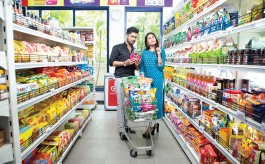Indian consumers will expect brands to play a more active role in driving social change, says report
By Retail4Growth Bureau | March 22, 2022
Mintel has announced the Indian Consumer 2022 report, uncovering some key trends that will shape the future of the Indian consumer market, including their preferences for and expectations from brands across food, drink, and beauty industries.

Mintel has announced the Indian Consumer 2022 report, uncovering some key trends that will shape the future of the Indian consumer market, including their preferences for and expectations from brands across food, drink, and beauty industries.
Rushikesh Aravkar, Associate Director, Food and Drink Research, South APAC at Mintel said, “The pandemic has challenged many of the habits we took for granted. The behaviour change that it has brought about has driven consumers towards new routines and opened up new avenues for brands. Even as lockdown curbs were relaxed, the home emerged as a backdropfor fitness, work, and socialisation. Today Indian consumers are also prioritising their spending whether it’s on food and drink or beauty and personal care. The underlying criteria for consumers to make these purchases is to get value for their money. There has also been an increased interest in holistic well-being than it was pre-pandemic, with traditional Aryuvedic ingredients finding their way into Indians’ modern and urban lifestyles. These market trends are driving brands to embrace multi-functionality and address new occasions.”
The consumer and market trends observed by Mintel include:
FOOD AND DRINK
Tapping on the protein trend
The growing awareness about the importance of complete nutrition and the role of macronutrients in the process has got Indian consumers to watch their intake. Between November 2018 and October 2021, there has been a 25% increase in various food and drink product launches with high-protein claims.
Further, the plant-based claims among high-/added-protein food and drink launches in India continue to emerge albeit a small base of 1.5%. This is therefore an opportune time to highlight plant-based protein in India.
Exposure and trial are essential to driving meat substitute consumption
Preconceived notions over taste and experience remain the biggest barrier for plant-based meat with more than half of Indian consumers (55%) agree that vegetarian meat substitutes do not appeal to them. This resonates with just over half of the vegetarians across all age groups and more prominently among meat-eaters aged 18-44 than vegetarians. The key is to drive trials and demonstrate how meat substitutes are getting very close to the 'real thing'. Dozens of start-ups in India are now offering a range of second-generation plant-based meat alternatives such as vegan chicken, veggie burgers, keema, and kebabs, which precisely mimic their animal-based counterparts.
BEAUTY AND PERSONAL CARE
A shift from skincare to skin health
Consumers’ mindset towards skincare has evolved during the course of the pandemic. The beauty conversation has shifted from taking care of the outer appearance to one that comes from the inside out. About half of Indians attribute skin problems to stress (51%), lack of sleep (50%), and unhealthy diet (47%). Today, consumers have a different outlook towards beauty and they are expecting brands to respond to their new definition of beauty.
Amp up Indian consumers’ hair care regimen with scalp care
Shampoo forms an integral part of Indian consumers’ hair care regimen and is an essential non-discretionary expense. However, most brands continue to operate in the safe zone by addressing only hair problems and promoting the typical botanical/herbal and free-from claims.
Tapping into the new territory of scalp care can help grow the shampoo category even further. Nearly three-fourths (74%) of Indian consumers have scalp-related issues yet only 26% of shampoo launches focus on dandruff or skin disorder claims. It’s a huge gap that brands can fill.
‘Experience is all’ ─ a desire for overall experiences
The popularity of social media is influencing Indian consumers’ product choices and their expectations around it. They desire for products to be ‘more than just products’ that create deeper, meaningful experiences as outlined by the Mintel Trend ‘Experience Is All’.
Mintel data also shows that for Indian Gen-Z (47%) and millennials (52%), experiences are more important than material possessions. Brands have an opportunity to accentuate value-added experiences which can define and influence the consumers’ journey from decision-making to consumption.
Rushikesh Aravkar, Associate Director, Food and Drink Research, South APAC at Mintel concludes, “As Indian consumers continue to rethink different aspects of their lives, opportunities exist for food, drink, and beauty brands to complement these shifts whether it’s playing up the experience of local brands or connecting consumers with their roots through well-loved local ingredients and flavours. Looking ahead, consumers will also expect brands to play a more active role in driving social change, and cater to this sentiment of caring for society as they increasingly become aware of the complexity of the issues the world faces.”









Comments